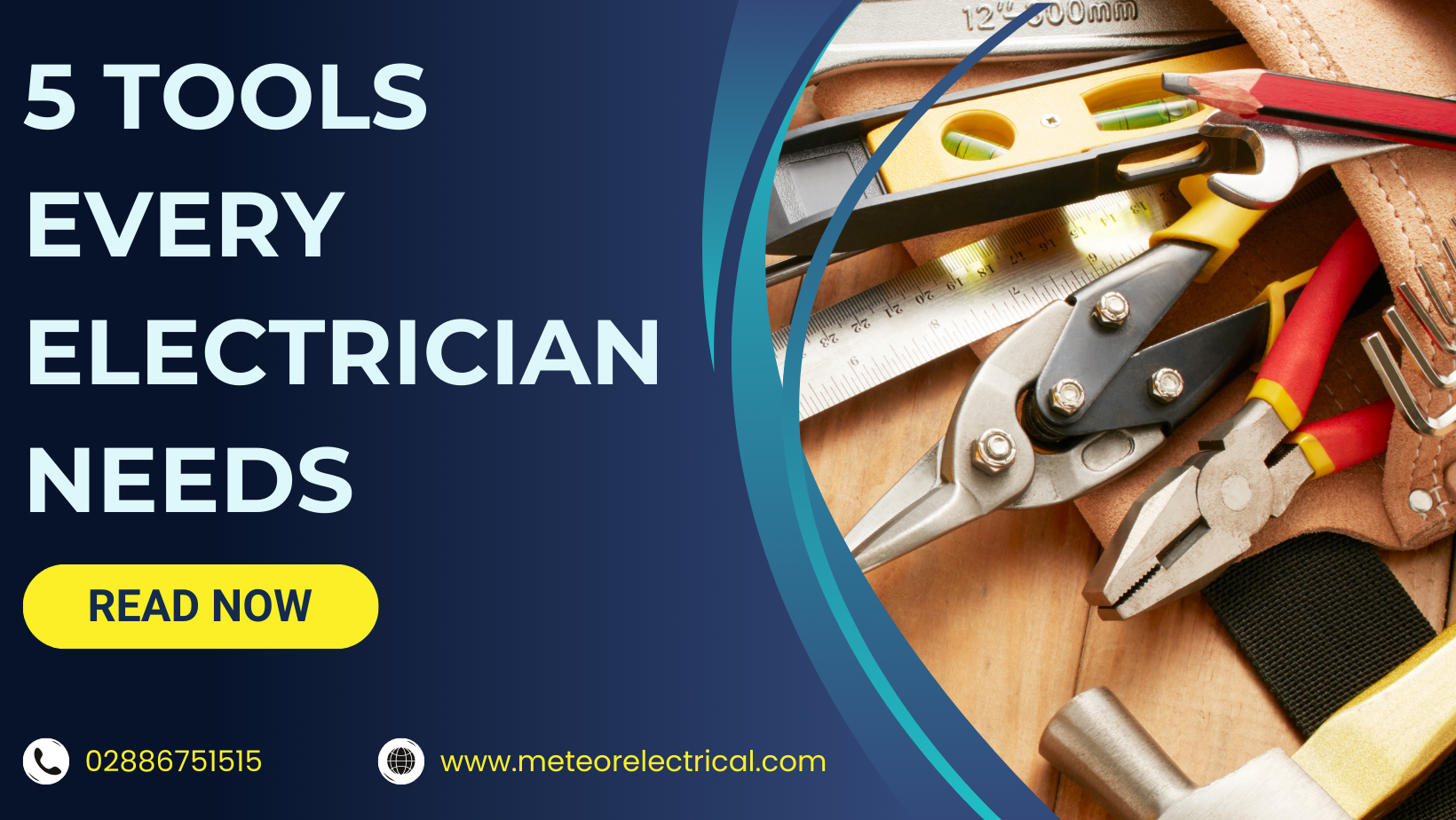Five Tools Every Electrician Needs In Their Toolbox
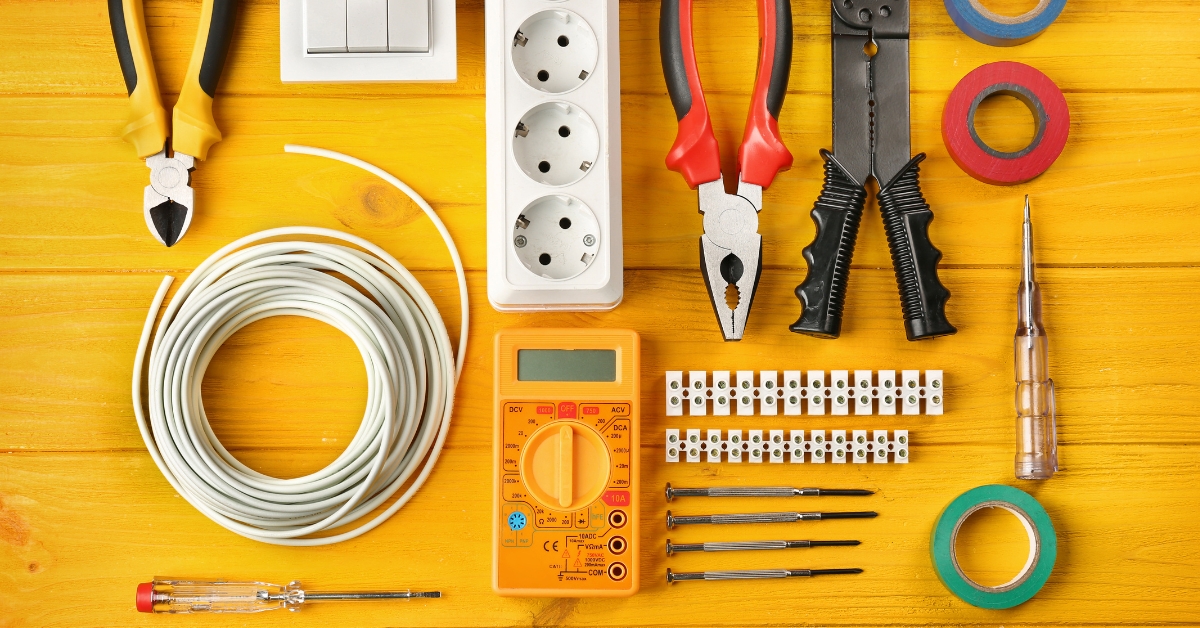
Whether you're an experienced electrician or just starting out, having the right tools in your toolbox can make all the difference between a smooth repair and a challenging job. Electrical work demands precision, safety, and efficiency, and the right tools help you meet those expectations. But what tools do electricians need the most? Let’s explore the five must-have electrical tools that should be in every electrician’s tool kit.
To ensure you're using the best equipment, always look for trusted brands and verified products. Sites like Electrical Safety First and HSE offer valuable guidelines on electrical safety and tool standards, ensuring you’re working within industry regulations.
Why Having the Right Tools Matters for Electrical Work?
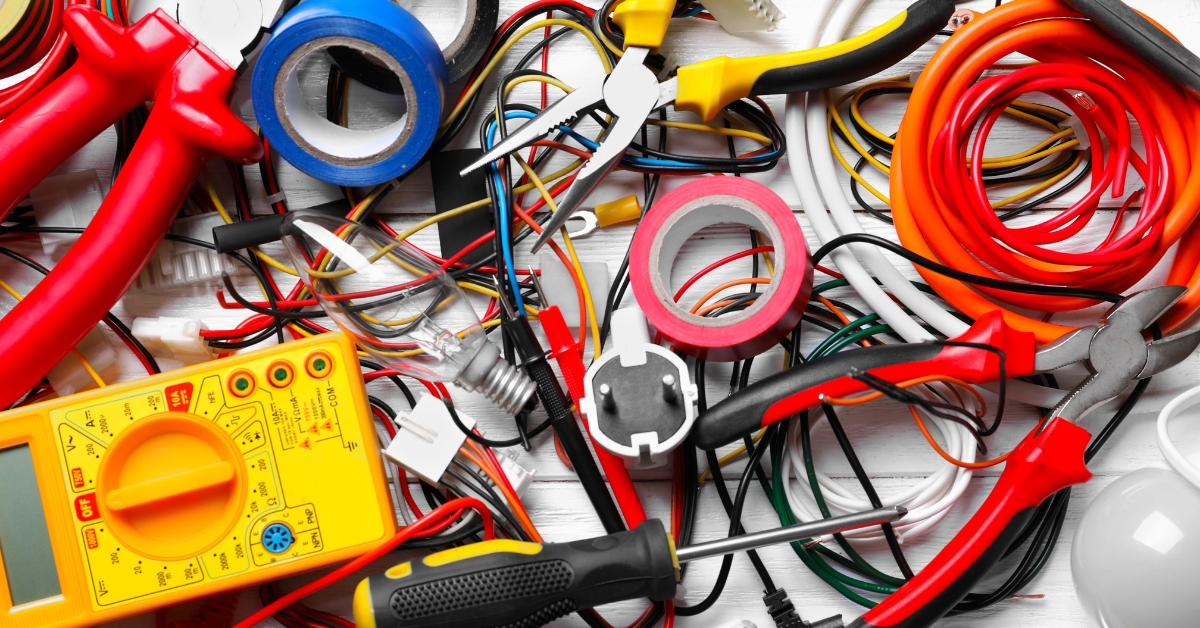
When it comes to electrical work, efficiency and safety go hand in hand. Knowing how to do the job is only part of the equation—you also need the right tools. Using the proper gear not only helps you get the job done faster but also protects you from potential hazards. From preventing electrocution to ensuring neat, professional work, high-quality tools make a big difference.
For anyone new to the 0f0i0el0d, investing in the right tools early on can give you a professional edge, helping you avoid mistakes and work more comfortably. Ultimately, these tools are not just about making your job easier—they're a critical investment in your career and safety.
For experienced electricians, keeping tools updated ensures that you're always ready for the next challenge. As technology evolves, so do the tools, making newer versions more efficient, ergonomic, and durable. If your current toolbox is showing its age, it may be time for an upgrade.
1. Wire Strippers
One of the most basic yet indispensable tools is a good pair of wire strippers. These tools allow electricians to remove the insulation from electrical wires without damaging the internal conductors. Without them, you'd risk damaging the wire, leading to poor connections and even electrical failures.
Wire strippers are particularly useful for preparing wires to be attached to connectors or terminals, allowing for clean, undamaged wiring. This tool helps you avoid making mistakes that could lead to electrical shorts or compromised safety. Additionally, some wire strippers come with a built-in cutter, allowing electricians to easily trim wires while stripping them.
Different types of wire strippers are available depending on the type of wire you're working with. Here’s a quick rundown:
- Triple Action Wire Strippers: Great for thick cables with tough insulation.
- Adjustable Wire Strippers: Handy for stripping, crimping, and snipping.
- Automatic Wire Strippers: Ideal for quick, effortless stripping of wires.
By investing in a reliable pair of wire strippers, you can ensure you're always ready for precise and safe electrical work.
2. Voltage Testers
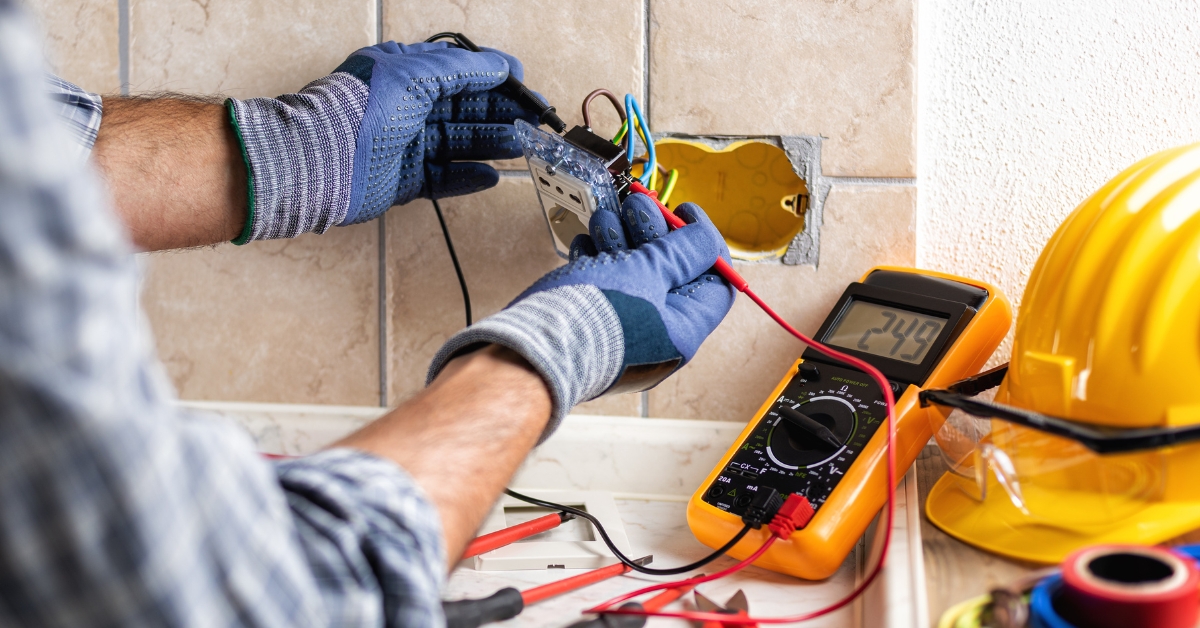
Before you start any electrical job, ensuring that the circuit is dead is a crucial safety step. Voltage testers are simple yet essential tools that check whether there’s any current running through the wires. If the tester indicates a live current, you'll need to turn off the circuit before beginning your work.
Voltage testers come in various types, such as contact and non-contact models. Non-contact voltage testers allow electricians to detect live wires without actually touching them, making the job safer. Contact voltage testers, on the other hand, require the tester to make contact with the wire to determine if it is live.
Using a voltage tester before starting any electrical work is a key practice recommended by health and safety guidelines. High-quality voltage testers, like those from Fluke, can help you avoid dangerous situations. In fact, many health and safety regulations require electricians to use these testers before starting any job.
3. Insulated Screwdrivers
No electrician’s tool kit is complete without a set of insulated screwdrivers. These tools are essential for tasks such as mounting junction boxes, installing light fixtures, or even tightening screws in electrical outlets. Insulated screwdrivers not only make your work easier but also protect you from electric shocks, as they can safely handle up to 1000 volts.
A well-rounded screwdriver set includes various sizes and types, such as:
- Small Straight Blade: Ideal for smaller components.
- Medium Phillips Screwdriver: Perfect for general use.
- Large Straight Blade: Best for handling large electrical systems.
What makes insulated screwdrivers different from regular ones is their protective handle and blade insulation, which significantly reduces the risk of accidental electrical contact. Always check for VDE (Verband der Elektrotechnik) approval when purchasing insulated screwdrivers to ensure they meet safety standards.
With a versatile set of insulated screwdrivers, you can handle virtually any electrical task while staying safe.
4. Insulated Pliers
Pliers are another multi-purpose tool that no electrician should go without. Whether you need to cut wires, strip insulation, or grip small components, insulated pliers get the job done while keeping you safe from electrical shocks.
Here are a few types of pliers that are particularly useful for electricians:
- Side Cutting Pliers: Perfect for cutting through cables and wires with ease.
- Long Nose Pliers: Ideal for reaching into tight spaces or handling small parts
- Locking Pliers (Mole Grips): Useful for gripping and holding objects firmly in place, especially when working with metal components.
Side cutting pliers are particularly popular because they offer precise cutting, making them indispensable for electricians. The long handles and insulated grips provide additional safety, helping you work comfortably for longer periods.
5. Utility or Safety Knife
A utility knife is the unsung hero of an electrician’s toolkit. From cutting through insulation to trimming cables, a sturdy utility knife is a must-have for handling various tasks on the job. The retractable blade ensures safety, while the sharp edge makes quick work of difficult cuts.
Most professional-grade utility knives come with replaceable blades, so you can always keep your tool in top shape. Look for knives with comfortable, non-slip handles for better grip and control. If the knife breaks or the blade becomes dull, swapping out the blade is an easy task, ensuring you’re always prepared.
Additionally, the shielded design of safety knives reduces the risk of accidental injuries, making it a safer option for quick, repetitive cuts.
Credit: Top Homeowner
Factors to Consider When Buying Electrical Tools
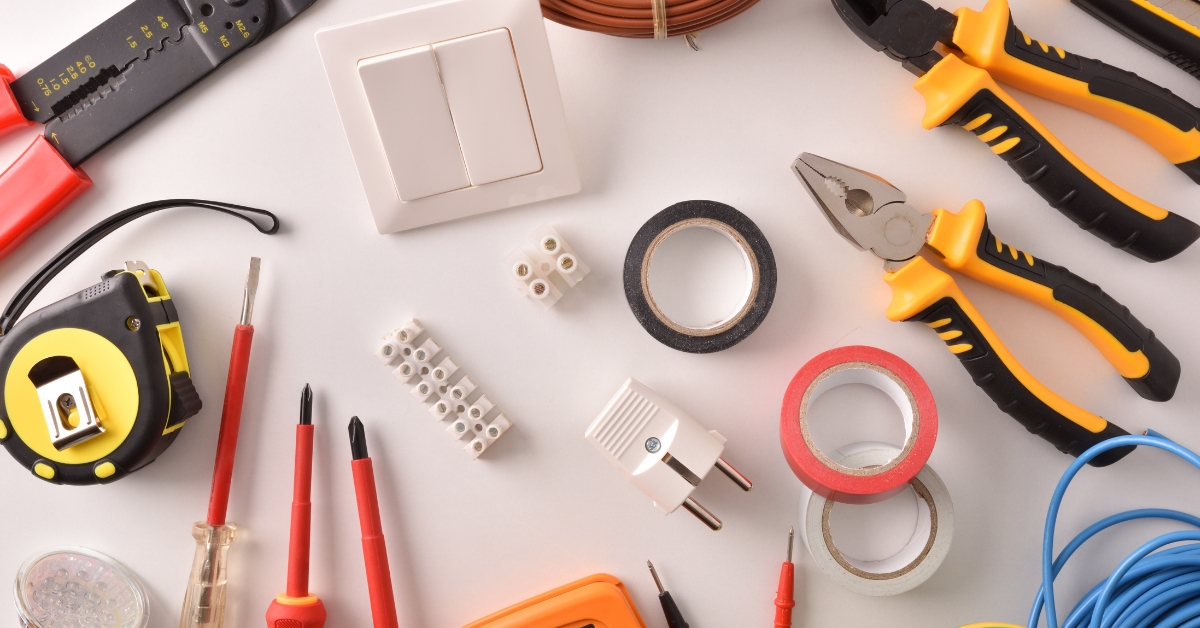
Even with a list of essential electrical tools, it’s easy to feel overwhelmed by the vast array of choices available. From budget considerations to safety features, there are several factors to weigh when purchasing the right tools for the job.
To make the process easier, here are some key factors to consider when buying electrical tools.
1. Set Up a Plan
One of the most effective steps in purchasing electrical tools is to set up a clear plan before you begin. While this may seem like a basic tip, it helps you stay organised and prevents impulsive purchases.
Start by identifying what tools you need, focusing on those essential for your daily tasks. For example, use the list of five must-have electrical tools as a foundation and build from there. By outlining your specific needs, you ensure that your toolbox contains only what is necessary, which helps you stay focused while shopping.
Having a plan also helps you manage costs, preventing you from buying items you don’t need. You can avoid cluttering your toolbox with redundant tools, ensuring you purchase only what’s essential for your work.
2. Create a Budget
Next, establish a budget before you start shopping for electrical tools. If you’re new to the trade, it’s important to set a reasonable budget. While some tools can be expensive, you don’t need to break the bank to get high-quality gear.
When setting your budget, remember to prioritise quality. Opt for tools that strike a balance between affordability and durability. It’s tempting to choose cheaper options, but sacrificing quality could compromise your safety and the lifespan of your tools.
If you’re working with a tight budget, leave some flexibility for adjustments. You might find that different manufacturers offer varying price ranges for similar tools. For example, one brand of pliers might be significantly cheaper than another, but ensure you research the brand's reputation to avoid compromising quality. Trusted tools may come at a higher cost, but they often last longer and provide better safety.
3. Consider Environmental Impact
In today’s world, sustainability is a growing concern, and it’s no different when buying electrical tools. Look for tools made from eco-friendly or sustainable materials to minimise your carbon footprint.
Many companies now focus on creating environmentally friendly products. By opting for green alternatives, you help reduce waste and contribute to a healthier planet. Plus, sustainable tools often come with the same durability and functionality as traditional products.
4. Research Reviews
Before purchasing any electrical tool, it’s crucial to check product reviews. Reviews from other electricians or professionals provide valuable insights into how a tool performs under real-world conditions.
In addition to online reviews, you can ask colleagues or mentors for recommendations. Gathering firsthand opinions will help you make informed decisions and avoid wasting money on unreliable products.
5. Look for Brand-New Electrical Supplies
While second-hand tools might save you some money upfront, they often come with hidden risks. Electrical tools wear down over time, and used products may not offer the same level of safety as new ones. In some cases, pre-owned tools could be damaged or worn out, posing a potential hazard.
If you decide to purchase second-hand tools, ensure they are thoroughly inspected and come from a reputable brand or supplier. Companies that specialise in used equipment often offer warranties, which provide some peace of mind. However, when possible, opt for new tools to ensure reliability, longevity, and maximum safety.
| Factor | Description |
|---|---|
| Planning | Make a checklist of the essential tools you need for your work, and avoid buying unnecessary items. This helps you stay organised and saves money. |
| Budget | Set a reasonable budget and prioritise high-quality tools. Cheaper tools may compromise safety and durability. |
| Safety and Quality | Ensure tools are certified by recognized safety organizations like VDE, and always prioritise tools that offer protection against electrical hazards. |
| Environmental Impact | Opt for tools made from sustainable materials and those that have been manufactured with environmental responsibility in mind. |
| Reviews and Recommendations | Check product reviews and ask for recommendations from other professionals to ensure you're purchasing reliable and durable tools. |
| New vs. Second-Hand | While second-hand tools may save you money, new tools are generally safer and more reliable. If buying used, ensure they are in excellent condition and from reputable sources. |
What Is Electrical Safety?
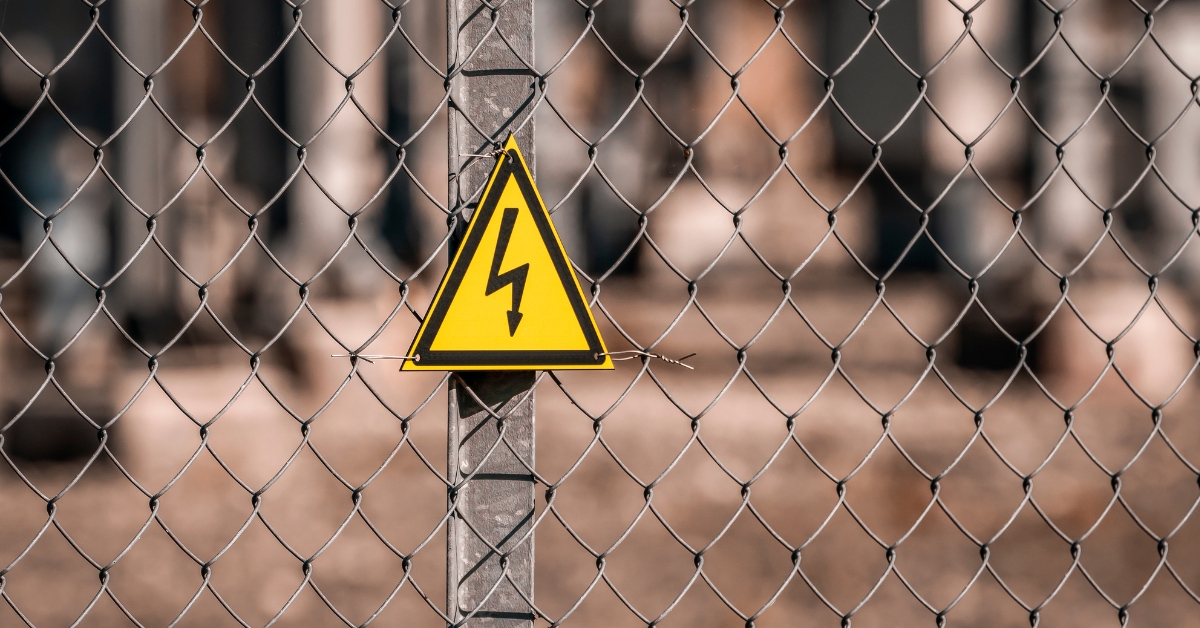
Having the correct tools is only one part of successfully completing a repair job. You also need to follow safety rules.
While having the right tools is essential for electrical work, safety is equally important. Electrical safety refers to the practice of handling electrical wiring, tools, and systems in a way that minimises risk. For electricians, this means following strict guidelines to avoid accidents and injuries.
Electrical hazards can arise unexpectedly, even for seasoned professionals. Being aware of these hazards and taking the right precautions is key to staying safe on the job. Whether you’re a beginner or a master electrician, electrical safety should always be a top priority.
Common Electrical Hazards and How to Avoid Them
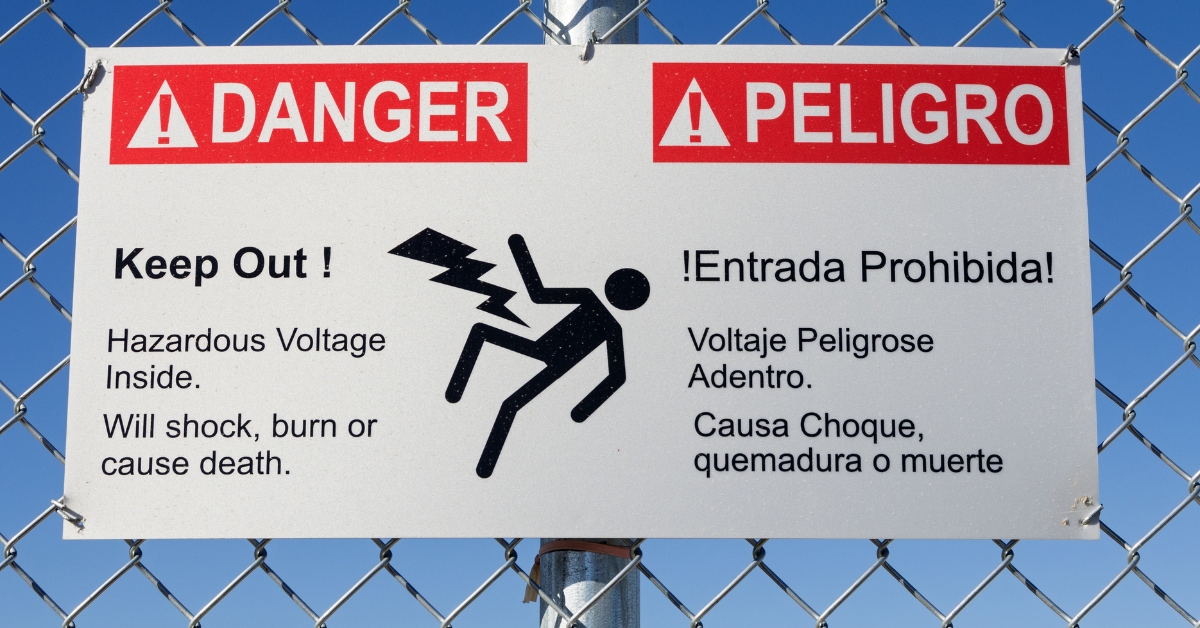
Electrical accidents are often the result of overlooked hazards. Below are some common electrical hazards and how you can avoid them:
1. Faulty or Damaged Wiring
Damaged or frayed wiring is a significant safety risk. These wires can cause electrocution or even start electrical fires if not addressed promptly. Always inspect electrical wiring and cords for signs of damage, such as fraying or cracking.
To avoid damaging wires yourself, never staple or run cables under carpets, as these actions can degrade the insulation. If you discover damaged wires, replace or repair them immediately to prevent accidents.
2. Using Electrical Equipment with Incorrect Voltage
Using equipment that requires a different voltage than what’s supplied can lead to overheating, equipment failure, and even electrical fires. Always check the voltage rating of both the device and the power outlet before plugging anything in.
Incorrect voltage not only risks damaging your equipment but can also reduce the lifespan of the device. If in doubt, consult an expert or refer to the product manual to ensure voltage compatibility.
3. Not Using the Right Gear
If you’re going to handle electrical equipment, practice safety first. Safety gear is non-negotiable when working with electrical systems. When handling live circuits, wear insulated gloves, a face shield, and safety goggles. Depending on the job, you may also need protective gear like hard hats or flame-resistant clothing.
The right safety gear is a barrier between you and potentially harmful electrical currents, so ensure you’re adequately protected before starting any work.
Credit: HSEBox
Find the Best Electrical Supplies at Meteor Electrical
Looking for the best electrical tools and equipment? Meteor Electrical has got you covered. At Meteor, we offer a wide range of high-quality tools that ensure safety and reliability on every job.
Whether you’re an experienced electrician looking to upgrade your tools or an apprentice building your first toolbox, our products meet the highest industry standards. From insulated screwdrivers to voltage testers, Meteor Electrical has everything you need to work efficiently and safely.
Visit Meteor Electrical today to browse our extensive selection of electrical tools and supplies. Let us help you create the perfect toolkit for any job!
Conclusion
Purchasing the right electrical tools doesn’t have to be overwhelming. By setting up a plan, creating a budget, and considering the safety and environmental impact of your tools, you can make informed choices that serve your needs in the long run. Don't forget to do your research and prioritise quality over cost to ensure both your safety and the longevity of your tools.
For electricians at any stage in their career, having access to high-quality, reliable tools is essential. At Meteor Electrical, we pride ourselves on providing top-tier electrical supplies for professionals across the UK. Explore our selection today and gear up for success!
FAQs
1. What should I consider when buying electrical tools?
When buying electrical tools, consider factors such as safety, durability, brand reputation, and cost. It's essential to balance affordability with quality to ensure the tools last and perform reliably.
2. Why is it important to use insulated tools for electrical work?
Insulated tools protect you from electrical shocks by providing a barrier between you and live electrical circuits. They are designed to safely handle high voltages, reducing the risk of injury.
3. How do I check if my electrical tools are safe to use?
Regularly inspect tools for signs of wear, damage, or loose parts. Ensure they are certified by trusted safety organizations (such as VDE) and always use tools according to the manufacturer's guidelines.
4. What are the most essential tools for electricians?
Wire strippers, voltage testers, insulated screwdrivers, insulated pliers, and a utility knife are essential tools for electricians. These tools are critical for performing most electrical tasks safely and efficiently.
5. Can I use second-hand electrical tools?
While you can use second-hand tools, it’s safer to buy new ones. Used tools may have compromised safety features and might not last as long as new tools. If buying second-hand, ensure they are in good condition and from a reputable source.

